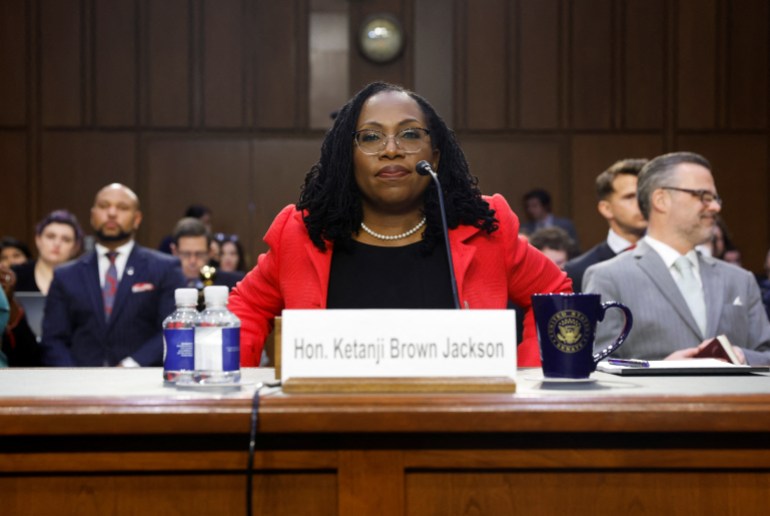Biden’s US Supreme Court pick Jackson faces senators’ questions
Republicans expected to question Ketanji Brown Jackson about her views on race in the law and her work for Guantanamo detainees.
Confirmation hearings for United States Supreme Court nominee Ketanji Brown Jackson are expected to heat up on Tuesday as she is sharply questioned by senators in her bid to be the first Black woman on the country’s highest judicial bench.
The federal judge, who briefly introduced herself to the American public at the start of televised sessions on Monday, faces hours of questioning on her sentencing record and judicial philosophy.
Jackson on Tuesday said she had a methodology “in order to ensure I am ruling impartially” and pledged to “stay in my lane” if confirmed to a lifetime position on the Supreme Court. She rejected Republican claims that she has been lenient towards some child pornography defendants.
“As a mother and a judge who has had to deal with these cases, I was thinking that nothing could be further from the truth,” Jackson said.
Jackson, a 51-year-old Harvard Law School graduate, is widely expected to be confirmed to succeed fellow liberal Justice Stephen Breyer, who retires by July.

Her addition to the 6-3 conservative-leaning bench would not shift the balance of power, but it would make history. Of 115 Supreme Court justices, 108 have been white men.
Tuesday’s hearing is the first of two full days of questioning by senators.
On Thursday, the committee will hear from legal experts before moving Jackson’s nomination to the full Senate for a vote. Barring unexpected developments, Democrats who control the Senate hope to wrap up her confirmation before mid-April.
“Over the course of the week, I expect the American people will finally see for themselves why Judge Jackson is one of the most qualified individuals ever to be nominated to the Supreme Court of the United States,” Senate Majority Leader Chuck Schumer said in a statement.
A Politico/Morning Consult poll released on Tuesday showed that 47 percent of voters think Jackson should be confirmed, while only 19 percent were against.
In a 12-minute statement on Monday, Jackson told senators that she would “apply the laws to the facts of the case before me, without fear or favour, consistent with my judicial oath”, if she were to be confirmed.
Jackson emphasised she has been independent in her nine years as a federal judge, deciding cases “from a neutral posture”.
But Jackson can expect a rougher hearing over the coming days. While Republicans do not have the votes to stop President Joe Biden’s nominee from being confirmed, senators will use the national spotlight of her confirmation to further their own political agendas.
Senators on Tuesday are expected to dig into Jackson’s record serving on the US Sentencing Commission and her representation of two Guantanamo Bay detainees. She worked from 2005 to 2007 as a court-appointed lawyer paid by the government to represent criminal defendants who could not afford counsel.
Among her clients was Khi Ali Gul, an Afghan detainee at the US naval base at Guantanamo Bay, Cuba. The US released Gul with three other detainees back to Afghanistan in 2014 when she was no longer involved in the case.

Republicans have voiced doubts about whether Jackson would seek to interpret the law or to remake it according to her political views. Several have suggested that the former public defender would be “soft on crime”.
Republicans also are expected to question her views on a so-called “court packing” proposal circulating among liberals to reverse the court’s 6-3 majority by adding more seats to the bench.
On Monday, Republican Senator Marsha Blackburn questioned whether Jackson has a “hidden agenda” to introduce critical race theory into the Supreme Court’s judicial rulings. Critical race theory is an increasingly politicised field of academic work on patterns of systemic racism in American society.
Republican Senator Josh Hawley, a former prosecutor, had claimed Jackson’s prior rulings showed a pattern of issuing lower sentences in child pornography cases. The Republican National Committee echoed his claims in blast messages to supporters.
Democratic leaders rejected the accusation, accusing Hawley of selectively picking quotes and context to suit his narrative, while independent fact-checkers had debunked Hawley’s claims.




